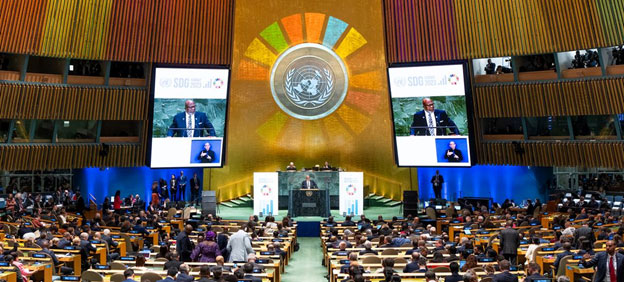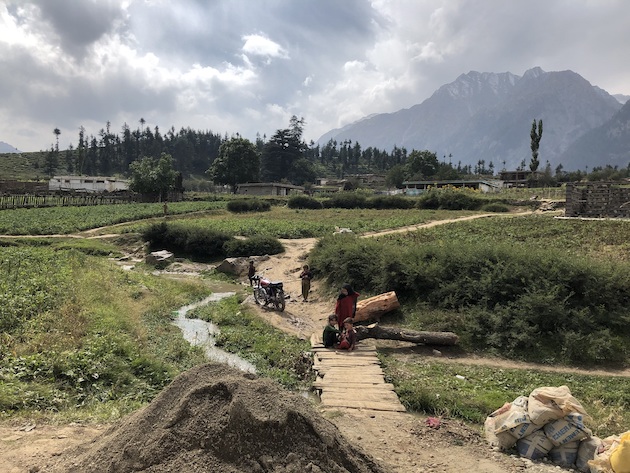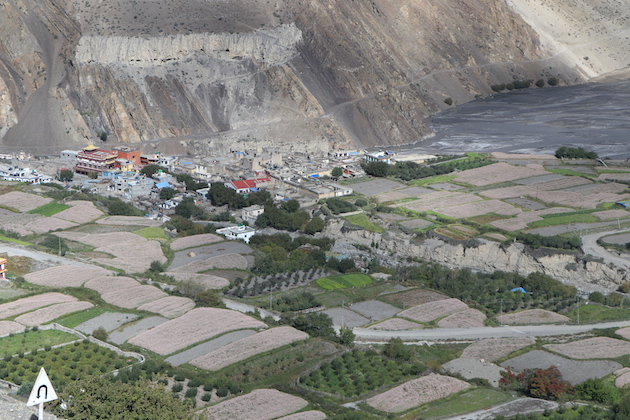Reality is Governments Not Truly Held Accountable to Implement SDGs — Global Issues
KATHMANDU, Nepal, Sep 22 (IPS) – What does transformative and sweeping really mean in the overarching efforts to achieve the Agenda 2030?
With the conclusion of the second edition of the SDG Summit, it is time for stocktaking on what was agreed at the United Nations HQ in New York this week. At the core of the Summit were not the several Leaders’ Dialogues that, as important as it can be to have heads of state and government reflecting on the Agenda, are just talking shops without any practical implications.
Instead, what deserves more scrutiny is the Political Declaration that was issued during the Summit after months of negotiations facilitated by the governments of Ireland and Qatar. The document has been heralded as truly significant, a “transformative and sweeping” game-changer that will be able to reposition sustainable development at the center of the global deliberations.
But is it really so?
Certainly, the Declaration contains some bold language that truly makes an attempt at securing the international community’s steadfast leadership towards the Agenda 2030. Yet would this be enough to command not only the commitment of the world’s government to achieve it but also a through follow up and implementation in the months and years ahead?
As we know, the SDGs are far from being on track and each report being published, confirms it. The fact that the Declaration is comprehensive because it covers the whole spectrum of policy making that is covered by the 17 SDGs contained in the Agenda, is hardly enough.
After all, the expectations were high as the document was supposed to be an actionable and provide impetus for change.
Real leadership means and implies actions and after the conclusion of the Summit, no one can be optimistic that the governments will concretely step up. The reality, no matter how much the UN is trying to portray it in a such a way, those expecting doable, concrete and detailed advances, are now feeling disappointed and frustrated and rightly so.
It is true that the final text does offer a lot of attention has been given to the inter-linked challenges of climate change and biodiversity loss. Yet for these two global issues, any figures estimated to address them, disappeared from the final approved document.
Indeed, any references to the goal of delivering 100 billion US Dollar by 2025 (yearly, let’s not forget it, even if this detail did not make even in one of the initial draft circulated) did not find space in the approved Declaration. The same could be said for the $700 billion biodiversity fund included in the Kunming-Montreal Global Biodiversity Framework.
A consolation could be found in having the proposal of an SDG Stimulus, one of the key proposals being pushed by the UN Secretary Geneal, being mentioned. Unfortunately, also in this case, the number of $ 500 billion annually proposed by Mr. Guterres did not make the final cut.
With the industrialized nations struggling to deliver on their promises in the field of climate action, having a paragraph, even though a brief one on the Stimulus, can be seen as a victory especially for Mr. Guterres. The Secretary General might feel mixed emotions about the final Political Declaration.
It is true that his ambitious idea of the Summit of the Future, scheduled in 2024, got included even though apparently without much enthusiasm from the international community. Yet, on the other hand, the concept of a New Social Contract, so central to the reform agenda of Mr. Guterres, was completely ignored.
This might be unsurprising considered the political implications (and consequences) of what can be described as a bold attempt at reviewing and renewing the relationships and dynamics between the state and its citizens.
After all, at the United Nations everything that sounds too political (and truly transformative) is going to be strongly pushed back by the member states, especially those which have their own “unique” understanding of democracy and human rights.
Positively and probably unexpected was the attention that the Declaration gave to the latter. Indeed, human rights found acceptance in the document not only once but multiple times and this is praiseworthy, albeit, only symbolically.
A disappointment is the fact that no space was given to the importance of civic engagement, itself an element instrumental to bring forward the idea of a New Social Contract. Yet, even without any linkages to this overtly progressive idea, civic engagement and with it, one of its greatest manifestations, volunteering, did not find any space in the document.
Apparently UNV was not particularly active in the drafting process nor throughout the jamboree of side events organized around the SDG Summit and this is quite alarming. Even more is the fact that the Declaration does not offer any transformative plans or promises to empower youths.
It is as if the Policy Brief published in April by the Office of the Secretary General, Meaningful Youth Engagement in Policymaking and Decision-Making Process was not at all digested by the member states involved in the drafting of the final document.
On this regard, the establishment of an UN Youth Office, another key part of the reform agenda of Mr. Guterres, while significant, it is not at all transformative if tools and mechanisms are not created to enable youths to participate.
The issue of localization of the SDGs, probably, the best approach to involve and mobilize citizens, especially the youths in the pursuit of the Agenda 2030, also did not find due prominence. Likewise, the whole process of the Voluntary National Reviews or VNRs was not highlighted the way it should have been.
It remains quite incomprehensible why the member states are not so keen to translate the SDGs at local level. “We will continue to integrate the SDGs into our national policy frameworks and develop national plans for transformative and accelerated action” reads the Declaration.
“We will make implementing the 2030 Agenda and achieving the SDGs a central focus in national planning and oversight mechanisms”, the document further adds.
This acknowledgement is certainly welcomed but only a lot of political capital and commitment will be able to translate these lofty sentences in a truly revolution in the way policy making is currently carried out that is, far too remote and disconnected from the people.
Yet localizing the SDGs should have been seen as a true game changer and much more focus should have been devoted to. We should have gone well beyond the statement found in the Declaration, according to which, the Leaders says that “will further localize the SDGs and advance integrated planning and implementation at the local level.”
The Political Declaration is a positive document but, in no measure, a game changing one. The reality is that governments are not truly held accountable to implement their SDGs.
The VNRs mechanism is utterly inadequate and not only because it is voluntary but it is so also structurally speaking. Ultimately, there is no real watchdog with powers over the countries lacking their commitments in terms of delivering the SDGs nor the UN System has any real leverage to force the member states to submit their VNRs through a binding timeframe.
I wish the SDG Summit would resemble a COP Process like the annual one related to Climate Change with real pressure and real negotiations occurring. As per its current design, the leaders at the Summit just come to talk, preach, complain or condescending but there is no real high-level bargaining.
That’s why, for example, the wording on climate change, mentioned throughout the document, as significant as they are, do not touch the real debate of phasing down and phasing out fossil fuels.
In this context the fact that the Political Declaration did not mince a word on the ongoing but stalled negotiations on a legally binding mechanism or Treaty on Business and Human Rights, becomes, unfortunately, something superfluous and expendable.
The Writer is the Co-Founder of ENGAGE and The Good Leadership and is based in Kathmandu.
IPS UN Bureau
Follow @IPSNewsUNBureau
Follow IPS News UN Bureau on Instagram
© Inter Press Service (2023) — All Rights ReservedOriginal source: Inter Press Service
Check out our Latest News and Follow us at Facebook
Original Source





